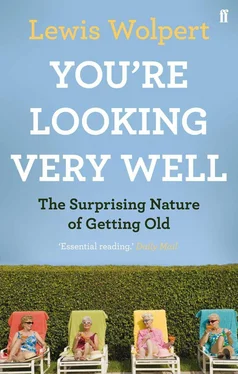A new star has appeared in the field of drugs that delay ageing in laboratory animals, and are therefore candidates for doing the same in people. The drug is rapamycin, already discussed in relation to TOR, its target, and which is in use for suppressing the immune system in transplant patients and for treating certain cancers. It can increase the lifespan of nematodes and fruit flies, and recently increased the lifespan of mice significantly. Given to the mice when they were 600 days old, it increased their lifespan by about 30 per cent. It has not been tested on humans and this should be done with great care because of its effects on the immune system. Studies in mouse models indicate that weakening the pathway on which rapamycin acts leads to widespread protection from an array of age-related diseases.
* * *
Aubrey de Grey is a scientist who, contrary to the standard scientific view, believes it will be possible to significantly prevent ageing. He calculates that two thirds of the people who die each day worldwide die of ageing, based on a definition of ‘death from ageing’ as death from causes that afflict the elderly more than young adults. He claims it will be possible to reduce the effects of ageing so greatly that humans will have a 50/50 chance over the next thirty years of being effectively immortal. He believes regenerative medicine may be able to thwart the ageing process altogether within that time. He works on the development of what he has termed ‘Strategies for Engineered Negligible Senescence’, a tissue-repair strategy intended to rejuvenate the human body. One basis for his claim is that mitochondria are damaged due to free radicals damaging their DNA, and they cause their host cells to secrete more damaging free radicals and so damage other cells. He believes that it will be possible to obviate the damage in the mitochondria’s DNA. He also claims that many age-related degenerative diseases are linked to inadequate lysosomal function. Lysosomes are small vesicles in cells whose contents can destroy almost any unwanted cellular material—but not quite all, and this shortfall is known to underlie various age-related problems, including cardiovascular disease and macular degeneration. Alzheimer’s disease involves the failure of unwanted proteins to be destroyed by other waste disposers both inside and outside the cell. Amyloid protein aggregates, a possible cause of Alzheimer’s, are made from a normal protein that has been altered. An anti-amyloid vaccine could be helpful as the immune system would destroy the aggregates. A clinical trial along these lines was stopped when one individual became very ill, but a new trial has now reached phase 3.
In order to prevent ageing in this way, it will be necessary to repair, or else render harmless, numerous types of accumulating molecular and cellular damage so that the age-related pathologies caused by excessive amounts of that damage are prevented. In various cases, this requires manipulating genes, which at present would need to be done in the fertilised egg. And then the researcher would have to wait more than a hundred years to see if that individual survives that long, and suffers no problems from the manipulation to the genes. This is a most unlikely scenario; it is far too risky, and few if any researchers would live to see if their treatment worked. Thus, as de Grey accepts, the comprehensive application of regenerative therapies to ageing within a few decades relies on the development of safe and highly effective somatic gene therapy, which currently remains a daunting prospect. Additionally, an effective panel of therapies must address cancer, extracellular damage causing pathologies such as heart disease, and viral and bacterial infections. Finally, it is also far from clear that preventing cellular ageing would prevent cognitive abnormalities such as dementia and depression occurring, and de Grey acknowledges our ignorance of such matters.
* * *
In the UK the life expectancy for men and women is now 77 and 82, and a young man in his 20s today is expected to live five years longer than a man in his 50s. There are estimates that one in eight UK citizens now aged 35 will live to over 100. Half of the children alive today in countries with high life expectancies may celebrate their 100th birthday. In the UK, with a population of 61 million, 400,000 are over 90 and there are more pensioners than children under 16. The small village of Montacute in Somerset has the highest life expectancy for men in Britain, possibly because many of them grow their own food and work hard at it. In the USA, male life expectancy is 75 and female is 81. There is expected to be an increase from 4 million to 20 million over-85s by 2050 in the USA, at which time there may be nearly one million centenarians. At present about 10 per cent of the world’s population is over 60 but by 2050 it will be 20 per cent, and the elderly will outnumber children worldwide. Women outnumber men at age 100 by 5 to 1. Japan has the current highest life expectancy for females, estimated at 85, and Iceland for males, at 80 years.
There are currently about 40,000 centenarians in the United States, and they are the fastest growing segment of the population. Traditionally scientists believed that most people who live to 100 experience a ‘compression of morbidity’—that is, they do not develop common age-related chronic illnesses like diabetes or coronary disease until very late in life, if at all. However, more recently, investigators have found that nearly one-third have in fact suffered from long-standing chronic illness, in many cases for 15 years or more, before turning 100. What they experience is a compression of disability: they avoid major disability and require little or no assistance in performing the activities of daily life, at least until extreme old age.
The increase in the numbers of elderly people throughout the developed world is already having serious consequences, which will only increase in the future. Leon Kass, who has been chairman of the US President’s Council on Bioethics, has questioned whether the resulting overpopulation problems would make life extension unethical. ‘Simply to covet a prolonged lifespan for ourselves is both a sign and a cause of our failure to open ourselves to procreation and to any higher purpose… Desire to prolong youthfulness is not only a childish desire to eat one’s life and keep it; it is also an expression of a childish and narcissistic wish incompatible with devotion to posterity.’ He highlighted the importance of lifespan limits in making room for new generations who deserve to take their rightful place in the world.
Francis Fukuyama, who predicted the eventual global triumph of political and economic liberalism, argues that efforts to increase human longevity risk undermining social security schemes, damaging family structures, and rendering the United States vulnerable to assault by countries with more youthful populations. He suggests that it could lead to a ‘posthuman future’, where human existence would be radically different from what we currently experience. This may be an alarmist view, but the problems associated with increasing human lifespans are still severe.
What impacts might a much further increase in age in the population have? Would immortality be a benefit or a disaster? In Kurt Vonnegut’s 1998 story ‘Tomorrow and tomorrow and tomorrow’ a grandfather aged 172 takes an anti-ageing potion; he drives his descendants mad by taking the best food and space. Many fear that extending lifespan without reducing illnesses would increase the time living with limited physical and mental abilities, but it could nevertheless offer new opportunities. Superlongevity, radical life extension, would require every citizen to learn new skills. There would probably be a craving for novel experiences. Even now, many of those who have retired feel much younger and wish to have an active life that can include new work and learning. Living longer would enable people to find out what the future is like, but they would need to be healthy and cared for—and not be bored. And note again that in spite of all the research, no way of preventing ageing other than by a healthy lifestyle has yet been discovered.
Читать дальше












